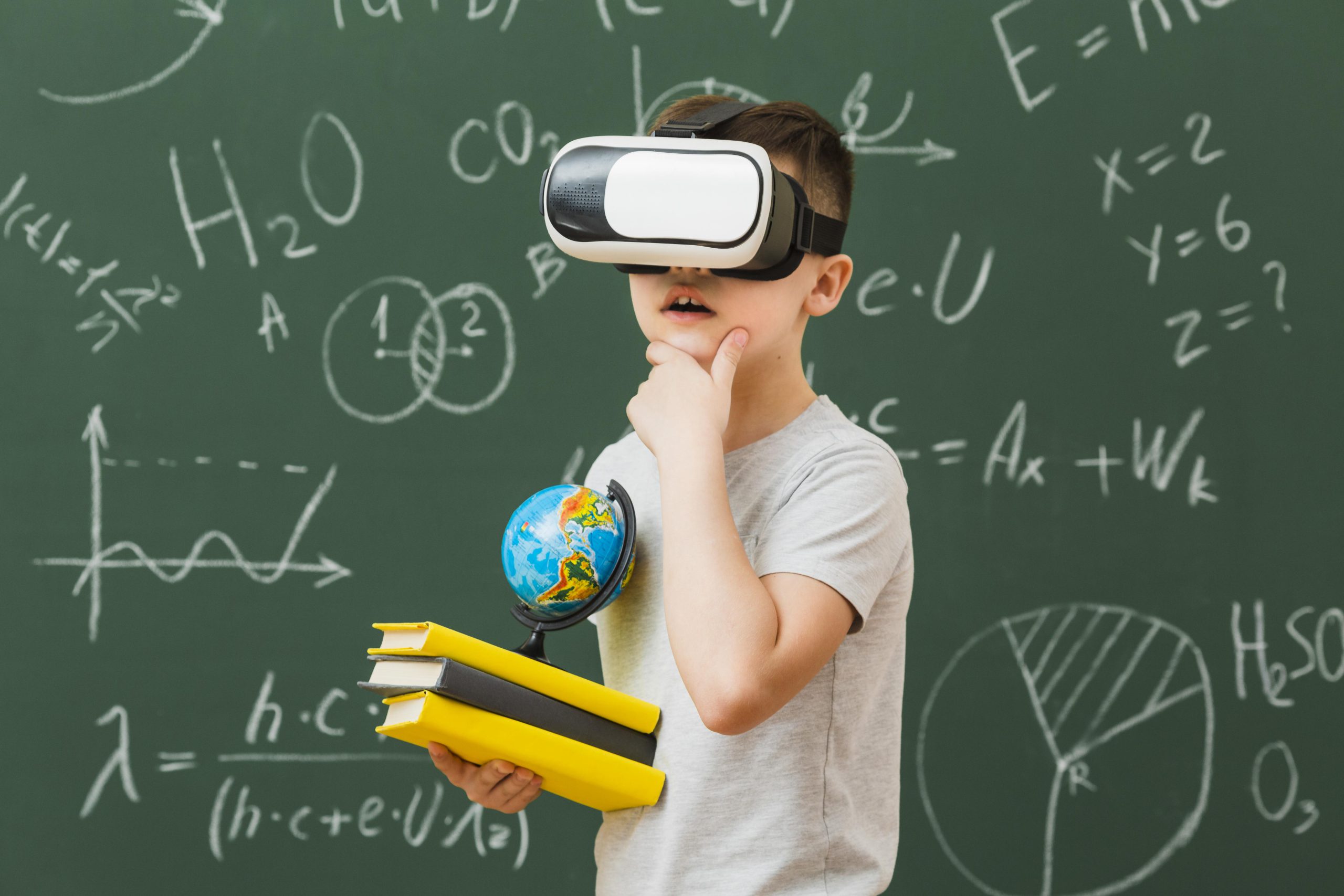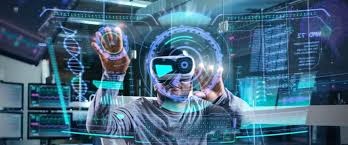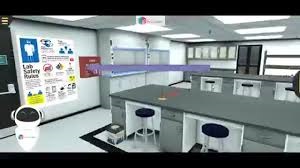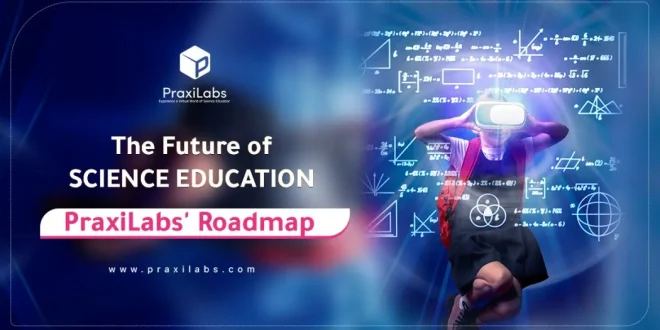Last Updated on August 22, 2025 by Muhamed Elmesery
The future of science education is now closely linked to technologies that are widely accepted and used, especially during and after the COVID-19 pandemic, which made the use of these technologies part of the regular curriculum. Virtual labs now are one of the most effective educational technologies that are used in universities and schools to enhance active learning outcomes and student engagement.
In this article, we will take a closer look at the future of science education how Praxilabs is paving the way for a revolution in the field of science education (PraxiLabs’ roadmap).

Table of Contents
The Evolution of Science Education | A report by Oxford University Press
According to the Evolution of Science Education Report 2021 by Oxford University Press, at the start of 2021, experts and teachers around the world responded to the report’s survey by providing the answers to the following five key questions:
- What should the core purpose of science education be?
- How well does current science education prepare learners?
- What are the biggest challenges that students might face in their future that science education should prepare them for?
- What new skills and competencies do students need to develop to address these challenges?
- What impact has the global Covid pandemic had on science education?
Note: The responses, insights, and comments received have formed the basis of the Evolution of Science Education Report 2021.
Let’s check their answers to know what the future of science education will be like.

What should the core purpose of science education be?
Teachers and experts responded by saying it was multi-faceted, and could broadly be summarized as the process of delivering against the following four criteria:
- Inspire learners to engage with science.
- Teach underpinning scientific concepts.
- Teach skills to enable effective experimentation.
- Help learners to achieve a range of desirable outcomes through science.
How well does current science education prepare learners?
- 66% agreed that the science curriculum currently taught in our schools enables young people to become scientifically literate and active citizens.
- 46% agreed that the science curriculum currently taught in our schools prepares young people to address the challenges that our world will face in the future.
- 31% agreed that science education is fit for the future.
What are the biggest challenges that students might face in their future that science education should prepare them for?
As the world continues to address the global Covid pandemic and the many scientific challenges it brings, teachers were relatively united when it came to identifying the biggest challenges that students might face in their future.

25% cited climate change as the biggest challenge in the future of science education.
What new skills and competencies do students need to develop to address these challenges?
Teachers cited the high need for cognitive and interpersonal skills, including:
- critical thinking.
- creativity.
- problem-solving skills.
- mental flexibility.
- communication skills.
- personal drive.
- collaboration skills.
- initiative.
- persevere ability.
- resilience.
What impact has the global Covid pandemic had on science education?
- 42% agree the pandemic hasn’t changed the focus of science education.
- 67% agree the way science is taught has changed as a result of Covid-19.
In general, fewer than half of teachers (42%) agreed that the focus of science education has not changed as a result of the Covid-19 pandemic. However, the broader findings of this survey suggest that the pandemic has prompted some re-evaluation of current science curricula and the need for change in the future.
Unsurprisingly, there was much stronger agreement that the way science is taught has changed as a result of Covid-19. Two-thirds (67%) of teachers reported this, citing fundamental changes, such as moving to online teaching, and fewer opportunities to conduct practicals and experiments. While the move away from the classroom is short term, it is important to consider the longer-term impact on those learners. Many governments are prioritizing the need for young people to catch up on lost learning due to lockdowns.
PraxiLabs Helps You Conduct Science Experiments Anywhere Via 3D Interactive Virtual Labs.

The Future of Science Education and Virtual Laboratories
Virtual lab technology is one of the most important solutions for teaching science. By using virtual lab simulations, students can perform experiments easily anytime and anywhere in an interactive virtual environment without any stress, hazards, or the need for real laboratory tools. They provide learners with computer-based materials, tools, and techniques for conducting offline or online experiments. This improves the student’s learning outcomes by creating a more immersive learning experience for students and enhancing their engagement.
Professors and educational institutes can integrate science education with the power of virtual laboratory technology by using immersive digital lab environments that support STEM education. With virtual lab technology, tasks such as monitoring student progress and grading assignments can be done automatically with computer-based materials, tools, and techniques for conducting offline or online experiments. spend more time interacting with their students and focusing on their individual educational needs.
Using virtual labs ensures that:
- Your students are protected from hazards like direct contact with toxic materials, explosive devices, electricity, and radioactive chemicals.
- Students can perform the experiment more than once (an infinite number of times).
- Teachers and students benefit from many features and benefits such as: grading\ personalization\ feedback on course quality\ tutoring\ meaningful and accurate feedback to students.
PraxiLabs virtual labs provide students and educational institutes with a big catalog of virtual science simulations for students in colleges and higher education. Our experiments cover different topics in biology, chemistry, and physics. Without any hazards or high costs, students can learn and understand scientific concepts and techniques through our virtual labs.
Visit our Blog to Explore “14 Ways Chemistry Experiments at Virtual Labs Improve Teaching“

How is Praxilabs paving the way for a revolution in the field of science education?
Innovative Approaches
Let’s discover how PraxiLabs is at the forefront of innovative teaching methods, using cutting-edge technology to enhance science education.
PraxiLabs provides science virtual labs for students, which is considered one of the most innovative teaching methods that enhance science education.
Just imagine that your students can do hard experiments remotely from home or classroom, without feeling pressured and to go to the real lab or provide expensive materials and equipment. Thanks to technological development, this is now possible through the technology of virtual laboratories.
Our virtual labs help the students to conduct experiments easily and enhance their practical knowledge by using 3D interactive and immersive simulations that simulate the real science laboratory. PraxiLabs virtual laboratories cover a wide range of topics in the fields of biology, chemistry, and physics. One of the most important features of our virtual labs is ensuring the safety of students while exploring scientific concepts, conducting virtual experiments, and making observations.
Interactive Learning
The main target of interactive learning is student participation, which can come through class or small group discussions, or through exploring the interactive learning materials given to students in a digital classroom (as in the virtual lab simulations).
One of the most important features of interactive learning is that it is able to reach different kinds of students in the classroom who may not excel with traditional academic study and this is precisely what we do through our virtual science labs, PraxiLabs provides interactive and immersive virtual 3D science experiments simulations of a realistic lab for students with better management of time, skills and knowledge to enhance the learning outcomes.
We provide practice game-like virtual experiment simulations without any limits. With several interactive learning materials that attract attention and make your students’ science learning intuitive and personalized, such as:
An awesome lab partner Oxi, skipping ahead (recorded in reports), hints, progress bar, and much more.
Practical Experience
Learn about Praxilabs’ commitment to providing students with a realistic and hands-on laboratory experience,
Bridging the gap between theory and practice is one of the main purposes for using virtual labs in science learning. In PraxiLabs virtual lab simulations, we provide our students with hands-on and realistic laboratory experiences to achieve the required learning objectives of their courses and enhance the ability to self-learn.
Global Accessibility
Using virtual labs breaks down geographical barriers and makes high-quality science education available to learners from diverse backgrounds.
PraxiLabs virtual Laboratories provide accessibility to students and learners who may not have access to traditional real laboratories due to various causes such as distance learning or unavailable physical resources. In these cases, virtual labs are considered the perfect solution, as they can be accessed from anywhere and anytime to allow learners to conduct experiments at their own pace.
Our virtual labs are available through the Internet, so students can perform many different experiments without being restricted to specific times or places, as is the case with real physical laboratories. Students can perform their experiments with 24/7 unlimited accessibility.
Also, by using PraxiLabs virtual labs, students can repeat the same virtual simulation of the experiment many times until they grasp and understand all the information and achieve the learning objectives.
PraxiLabs virtual labs provide a game-like experience that gives students many features like a little nudge with hints, lab manuals, skipping ahead at any stage (but still getting this reported), walkthrough videos, cautionary notes for toxic materials, instant support, and more.
To know more about virtual labs and artificial intelligence, visit our blog “AI Is Transforming Education | Role of Artificial Intelligence in Virtual Labs”.

Research Uses PraxiLabs Virtual Labs to Study the Impact of Integrating Virtual Laboratories in Chemistry Lessons
Under the heading “Technology-enhanced learning through virtual laboratories in chemistry education”, a research article was published in Contemporary Education Technology Journal that studied the impact of integrating virtual laboratories in chemistry lessons among 22 pre-service teachers who were enrolled in a Bachelor of Education program by using PraxiLabs virtual labs.
These participants were divided into an experimental group (EG) and a control group. Both groups engaged in the same organic chemistry lesson and subsequent lab session, the only difference being that EG received over six hours of hands-on training on PraxiLabs software and the specific chemistry experiment, “reactions of carbonyl compounds”. This was followed by an actual lab session with tangible materials.
A survey, conducted both before and after the experiment, was used to measure participants’ attitudes towards the use of virtual laboratories in science education.
The quantitative data analysis revealed a significant positive shift in EG’s attitudes post-intervention, suggesting that virtual laboratory experiences enhance learning and engagement. Specifically, participants exhibited improved understanding of the educational methodologies and heightened engagement during physical lab work.
These findings support the view of virtual laboratories as a viable supporting tool for science education, promoting technology integration into teaching practices to meet the demands of 21-st century learning outcomes.
Upon analyzing the data and results of this study, it can be concluded that using PraxiLabs effectively enhances students’ learning experiences. It does not only stimulate their engagement with the course content but also optimizes their preparation for actual laboratory work. Therefore, integrating virtual labs like PraxiLabs can serve as a significant supplement to traditional teaching methods in science education.
PraxiLabs, the 3D virtual lab solution, provides students with access to realistic biology, chemistry, and physics labs, enriching their understanding with a variety of informational and educational content.
 PraxiLabs A virtual world of science
PraxiLabs A virtual world of science






